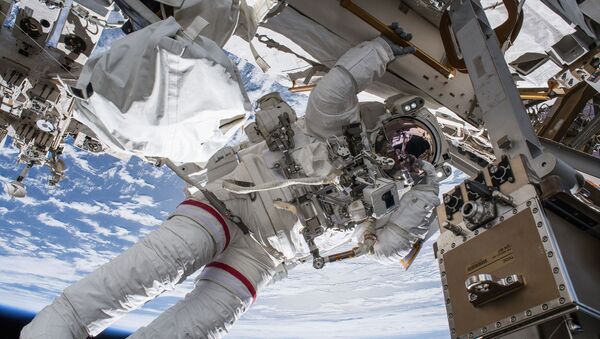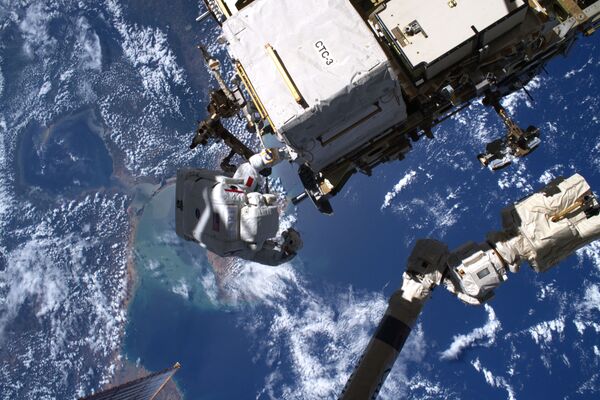"Currently, all the efforts of space agencies are aimed at preventing entry of any virus on the ISS, including the coronavirus", Batsmanova, who is also a senior nurse at the European Medical Centre clinic and a nurse at International SOS, said. "Taking into account the enhanced security measures, the chances for the coronavirus to get on the ISS are slim to none".
Batsmanova stressed that under normal conditions (not during a pandemic), astronauts and cosmonauts are in quarantine for some time before flying to the ISS and everything sent to the space station is disinfected.
"During a pandemic, these measures have been strengthened several times, quarantine measures for astronauts and cosmonauts have been extended, quarantine measures have been introduced for everyone who works with them, personal communication is limited, including with the media, and the number of teams working directly with astronauts has been reduced", the nurse pointed out.
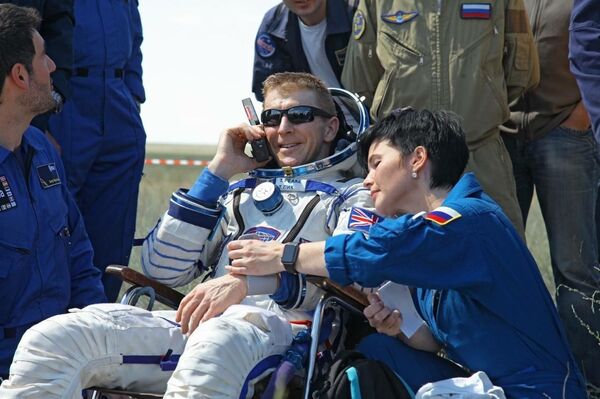
"Under no circumstances should any virus get onto the ISS, because the station has a closed-loop and its own atmosphere, and the crew is far from the ground. Today all the tough measures necessary for this are being followed", Batsmanova concluded.
The nurse has been working with NASA for almost 10 years providing medical assistance to astronauts during space launches and landings.
Returning to Earth Amid Pandemic
Batsmanova revealed that the number of people meeting the returning cosmonauts and astronauts from the International Space Station will be limited in order to avoid being infected with COVID-19.
"The entire team that will work on the next landing in April will undergo strict medical supervision", Batsmanova, who is also a senior nurse at the European Medical Centre and International SOS said. "At the moment, every inhabitant of the Earth is vulnerable to contracting the coronavirus. In the case of astronauts/cosmonauts who will return in April 2020, the number of persons meeting them will be reduced and all necessary precautions will be taken to avoid infection".
The nurse pointed out that virus data in the medical community about the experiences of other countries is updated hourly, and preventive measures are known.
"All this knowledge helps to reduce the risks of astronauts' infection during landing and helps astronauts return healthy to relatives and friends who are waiting for them", she stated.
Earlier in March, Russian State Space Corporation Roscosmos announced that it saw no need to delay the return of the International Space Station crew to Earth due to the coronavirus pandemic and the closure of borders between Russia and Kazakhstan.
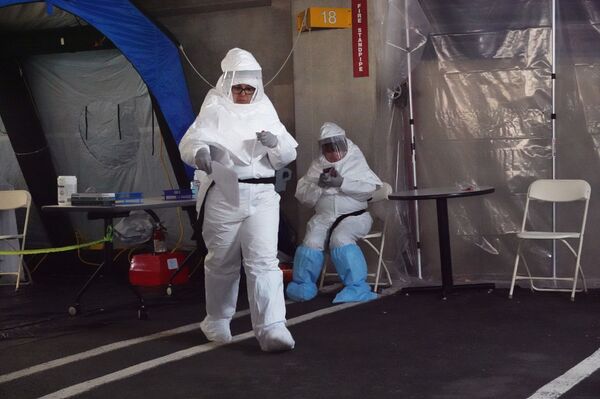
Moreover, Batsmanova said, all space agencies are fully ready to carry out all the planned flights despite the pandemic.
"The whole world is faced with a virus that no one expected, which imposed restrictions on all of humanity", she noted. "World space agencies are fully prepared for the implementation of the flight plan in the current environment. On 9 April 2020, the Russian-American crew, consisting of three people, will go to the International Space Station as scheduled".
The ISS crew is expected to return to Earth on 17 April. Russian experts and equipment are to be brought to the landing area to meet them. The crew is currently comprised of Russian cosmonaut Oleg Skripochka and US astronauts Andrew Morgan and Jessica Meir. On 9 April, Russian cosmonauts Anatoli Ivanishin and Ivan Vagner along with US astronaut Christopher Cassidy are expected to replace them.
Nurse Work With Cosmonauts and Astronauts
Batsmanova noted that she has been collaborating with NASA for almost 10 years and providing medical assistance to astronauts during space launches and landings.
"Before a rocket launch, the task of physicians is once again to verify the good health of astronauts/cosmonauts before a long stay at the International Space Station", she said. "During a landing of a spacecraft's descent vehicle, our international medical team works in the steppe, directly at a capsule, and our task is to assess the state of health of astronauts and, if necessary, provide first aid".
She pointed out that astronauts are always in touch with Earth and communicate with doctors through telemedicine.
"The health of the astronauts is monitored by the crew doctor, who gives recommendations on the necessary physical activity, on the use of medications and vitamins for the good condition of astronauts in zero gravity and upon returning to Earth", she went on to say. "A doctor evaluates the necessary physiological parameters, monitors cardiovascular and musculoskeletal systems of astronauts".
The NASA nurse continued to say that astronauts and cosmonauts provide regular reports on their health, depending on the plan.
"Astronauts/cosmonauts on board follow a regulated regime of sleep and wakefulness, alternate classes, experiments and physical exercises", she added. "Astronauts and cosmonauts are very disciplined and well aware that they need to play sports in order to maintain muscle tone, since in the weightlessness the human body behaves in a completely different way, bodily fluids are distributed differently, and the stress on the cardiovascular system is redistributed".
Batsmanova shared that the training plan for astronauts and cosmonauts includes a medical course and the basics of first aid so that each of them can help themselves and the crew if necessary.
"As a result of medical training, astronauts are able to take their own blood test, conduct self-diagnostic, make an ECG [electrocardiogram] take (measure) the necessary parameters to provide them to the ground", she noted. "The results of many medical tests are available to doctors on Earth in the online mode.”
The nurse also stated that when the crew is equipped, they try to have a doctor onboard the ISS, while on the ground, in addition to a crew doctor, the health of astronauts and cosmonauts is monitored by an international multidisciplinary medical team.
"There are first-aid kits onboard the ISS, and there is also a first-aid kit in a descent capsule in case of emergency unplanned crew landing", she said. "Astronauts and cosmonauts are familiar with the contents of first-aid kits and undergo all the necessary training on how to help themselves and each other".
When You Are Sick in Space
She stressed that Astronauts maintain close contact with doctors on Earth and receive the necessary recommendations.
The nurse also underlined that everything that astronauts and cosmonauts come into contact with must be sterile and safe.
"Despite all the precautions and careful medical and psychological selection before the flight, the astronauts are on board for 6 to 12 months and during this period someone can get sick since astronauts and cosmonauts are also people", she said. "At the first signs of sickness, an astronaut/cosmonaut contacts a doctor and fulfils the necessary recommendations".
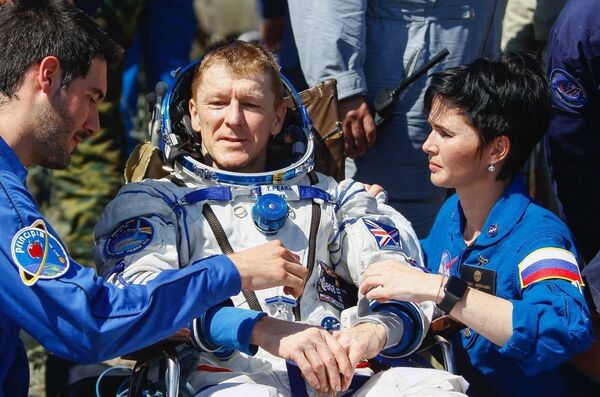
Batsmanova explained that the tasks of doctors on Earth to ensure the prevention of diseases are to monitor good nutrition, the necessary doses of vitamins, a regime of rest and training so that the bone and muscle systems feel no deficiency.
"In the history of space flights, once onboard one of the astronauts was found to have thrombosis", she shared. "The astronaut received and complied with the doctor's recommendations, conducted the necessary therapy on his own, which turned out to be effective according to the test results. The astronaut was allowed to return to the Earth normally, despite the increased load, and upon the landing, the medical team provided all the necessary assistance and therapy to the astronaut”.
The nurse also revealed that there have also been cases where astronauts have had to fix each other's teeth in space.
"During the landing, a large international team of doctors is working shoulder-to-shoulder, ready to provide assistance, despite [an] astronaut’s nationality”, she said. "Each of us clearly knows with whom of the crew he works directly, but if necessary, we all help each other".

